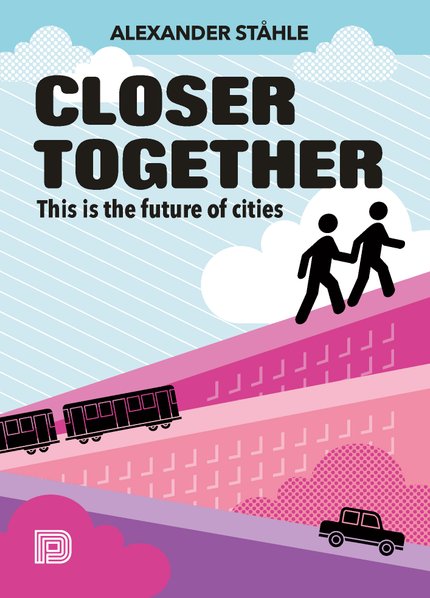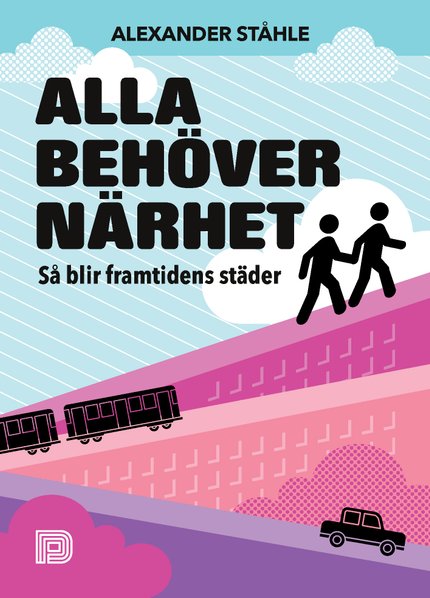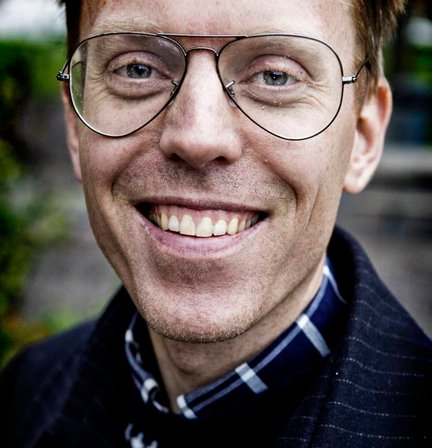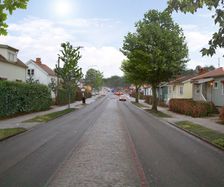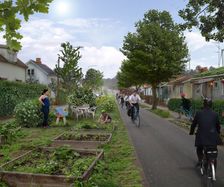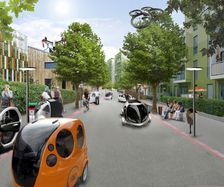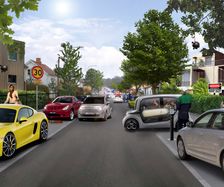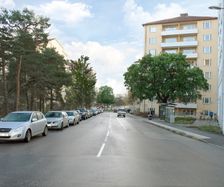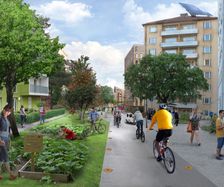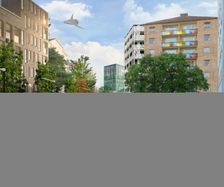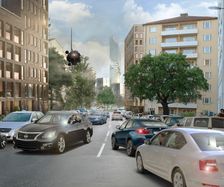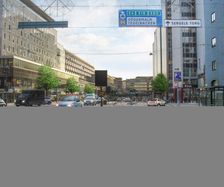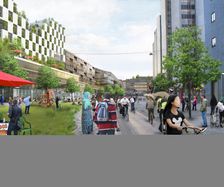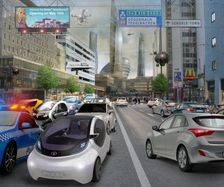What will future cities look like? In Closer Together city researcher Alexander Ståhle describes the economic and political driving forces of urban change and why we will drive less and live happier in the future.
ORDER HERE
DokumentPress Amazon.com Amazon.co.uk Guardian
REVIEWS
"Cities are places where people and cultures come closer together. This creates the opportunities and quality of life which defines sustainable development and successful cities. Closer Together describes how and why proximity is a fundamental driving force in future cities. An important book."
- Joan Clos, Executive Director of UN Habitat and former mayor of Barcelona
"People are social animals and cities are social places, yet so many cities are designed in ways that make it hard to be human amid wide avenues, diffuse neighborhoods and sprawling boundaries. Alexander Ståhle reveals the life hidden between the lanes and shows how we can kindle the best in our cities - and save the world - by bringing people closer together."
- Janette Sadik-Khan, Bloomberg Associates, former NYC Transportation Commissioner and Author of "Streetfight"
"In Closer Together, Alexander Ståhle presents a powerfully substantiated case for a compact city, where proximity, between people and people and the places where they realize their daily activities. It is an insightful glimpse into the more humane city that can be, often referring to debates in Sweden, one of the wealthiest and most democratic countries in the world, which are relevant to cities all over the world. Closer together gives an inspiring overview of the deformations cars brought to urban life and the way to go from there to create different, more humane, happier cities in the near future. I enjoyed it thoroughly."
- Enrique Peñalosa, mayor of Bogotá, Colombia
"What should the city of the future look like? Alexander Ståhle’s passion for this question has led him from Stockholm to Tokyo--and into the minds of thousands of his survey participants. It turns out that the city almost all of us say we want also happens to be the city that will save us from the converging crises of this urban century. Closer Together offers a rich, globe-trotting, evidence-based argument for a city that will bring out the best in all of us."
- Charles Montgomery, Urbanist and Author of "Happy City"
"Whether for health, economy, or happiness, Ståhle's Closer Together presents the most compelling prescription for proximity in cities yet!"
- Mike Lydon, Principal at The Streets Plans Collaborative and Author of “Tactical Urbanism”
"With Closer Together Ståhle presents a wonderfully unusual book addressing the state of our cities. It is a journey along three dimensions: a personal account of exposing oneself to debates and actions in urban development, an introduction to historic and contemporary urban thought, and a campaign to consider the virtue of proximity not only as critical asset for professionals but as a fundamental quality of family life."
- Philipp Rode, Executive Director, LSE Cities, London School of Economics and Political Science
"Given that Alexander Ståhle is one of the most optimistic urbanists I've run across in my travels, it's not surprising that he's written a fundamentally optimistic book about better cities. Living closer together is indeed the key to our future, & this book helps explain how to do it well."
- Brent Toderian, city planner & urbanist, TODERIAN UrbanWORKS, former Vancouver chief planner
“Closer Together is not just about urban density but rather human needs, community, and a future we all wish to obtain, whether our home is rural or urban. With great anecdotes, pop culture references, and personal reflection, Swedish urbanist Alexander Ståhle puts together a book of which all urbanists and transportation professionals should take note.”
- Jeff Wood, Urbanist and Podcaster, The Overhead Wire
“Close Together is a wonderful, hopeful, truly energizing, engaging and accessible tour-de-force on the meaning of cities, how we lost that meaning through motorisation and sprawl, and how we are going to regain it and create wonderful urban places for everyone to live today and into the future. The book’s easy, personal writing style and approach brings the world of cities and urban transport to life in a way that everyone can understand, get excited about and be inspired by. I’ve not seen any book yet in this field that is able to cover so much ground so quickly, accessibly and with so much genuine engagement with its readers. There are no dead end streets in this book. One always wants to read on to see what’s around the next corner. It moves rapidly and seamlessly between the major planning and transport debates, schools of thought and issues that have shaped cities, historically, are shaping them right now and how things might, indeed should, unfold in the future, if we really care about urban places. It does this by constantly shifting gears and direction through a fascinating mixture of interesting stories, personal experiences, academic works, current and past research projects, community activism cases, political leadership successes, landmark local initiatives and much more (even the lyrics of Bruce Springsteen songs!). There is so much happening in the world of cities today at every level that it is almost impossible to keep up. One of the strengths of the book is its genuine openness, honesty and breadth of thinking in bringing together an extraordinary range and type of material on what is happening in cities in so many diverse quarters. And it does this in a simple, succinct and interesting way, bringing to life so much important knowledge that we would never get to know about or appreciate unless we read this book. And above all the author infuses passion into the book’s subject material. So while it is rich in academic source material and draws factual material from those quarters, it never strays too far from what is a deeply personal and inspiring message, which the author feels and conveys in a very persuasive and impassioned way. Highly recommended for anyone interested in the future of planning and transport in cities and who wants to be alternately illuminated, entertained, intrigued and surprised on the journey.”
- Jeffrey Kenworthy, Professor in Sustainable Cities at Curtis University and Author of “Sustainability and Cities” och “The End of Automobile Dependence”
"Alexander Ståhle has written the most important book I have read in a long time about how we can seriously make our growing cities sustainable and good to live in. I have never seen so many and so persuasive evidence gathered in a compact format for we must turn upside down 'transportation power structure'. Pedestrians, cyclists and public transport must come first and the cars come last. and above all, he shows how it can be done - and that transformation has already begun! "
- Sverker Sörlin, historian, author and professor of environmental history at KTH
"This book is an important contribution to the discussion on how future cities should be shaped."
- Jonas Eliasson, Transportation Director at The City of Stockholm and Professor in Transportation System Analysis at KTH
BOOK RELEASE
Stockholm 20/9 at ArkDes
Vancouver 15/9 at ProWalkBikePlace
Hong Kong 5/10 at Walk21
Bogota 14/10 at WSRLR
THE AUTHOR
Alexander Ståhle aka Stockholm Cyclo, is one of the most popular and well-known speakers on urban futures and design in Scandinavia. He holds a PhD in Urban Design and is CEO of the studio Spacescape in Stockholm, and has been working with world-famous architects such as Bjarke Ingels and Foster and Partners on the most complex urban development projects in Scandinavia. Alexander lives in Stockholm with two children and no car.
Contact: alexander.stahle@spacescape.se
Twitter: stockholmcyclo
Publisher: Dokument Press
Hur kommer framtidens städer att se ut? I Alla behöver närhet berättar stadsforskaren Alexander Ståhle om de politiska och ekonomiska drivkrafter som förändrar städer och varför vi kör mindre och lever lyckligare i framtiden.
BESTÄLL HÄR
RECENSIONER
"Städer är platser där människor och kulturer kommer närmare varandra. Det skapar möjligheter och livskvalitet som bidrar till hållbar utveckling och framgångsrika städer. Alla behöver närhet beskriver hur och varför närhet är en fundamental drivkraft i framtidens städer. En viktig bok."
- Joan Clos, chef för UN Habitat och Barcelonas tidigare borgmästare
"Människor är sociala varelser och städer är sociala platser, ändå har så många städer utformats på ett sätt att det är svårt att vara mänsklig, med breda vägar, oklara grannskap och utglesning. Alexander Ståhle synliggör livet mellan körbanorna och visar hur vi kan ta fram det bästa i våra städer - och rädda världen - genom att människor kommer närmare varandra."
- Janette Sadik-Khan, Bloomberg Associates, tidigare New Yorks trafikchef och författare till "Streetfight"
"I Alla behöver närhet presenterar Alexander Ståhle ett kraftfullt väl underbyggt argument för den kompakta staden, där närhet mellan människor och mellan männniskor och platser där de kan förverkliga sina vardagsaktiviteter. Det är en insiktsfull vy av en mer mänsklig stad som kan skapas, ofta med referenser till debatter i Sverige, en av världens rikaste och mest demokratiska städer, relevant för alla städer i världen. Alla behöver närhet ger en inspirerande överblick av hur bilen deformerade stadslivet och hur vi borde göra för att skapa andra, mer humana, och lyckligare städer i den närmaste framtiden. Jag uppskattade den verkligen."
- Enrique Peñalosa, borgmästare i Bogotá, Colombia
"Hur borde framtidens städer se ut? Alexander Ståhles passion i denna fråga har lett honom från Stockholm till Tokyo - och in i tusentals personers tankar om framtiden. Det visar sig att den stad vi vill ha och är den stad som kan rädda oss ur vårt urbana århundrades kriser. Alla behöver närhet beskriver omfattande, världsomspännande, evidensbaserade argument för en stad som tar fram det bästa hos oss alla."
- Charles Montgomery, urbanist och författare till "Happy City"
"Oavsett om det gäller hälsa, ekonomi eller lycka, presenterar Ståhle´s bok Alla behöver närhet det hittills bästa receptet för närhet i våra städer!"
- Mike Lydon, The Streets Plans Collaborative och författare till “Tactical Urbanism”
"Med Alla behöver närhet presenterar Ståhle en underbar och ovanlig bok om läget i våra städer. Det är en resa genom tre dimensioner: en personlig exposé över debatter och stadsutvecklingsprojekt, en introduktion till historiskt och samtida urbant tänkande, och en uppmaning att se närhetens kvaliteter, inte bara som en resurs för verksamma utan även för familjens livskvaliteter."
- Philipp Rode, forskningsledare LSE Cities, London School of Economics and Political Science
"Givet att Alexander Ståhle är en av de mest optimistiska urbanister jag har mött under mina resor, är det inte överraskande att han skrivit en så optimistisk bok om bättre städer. Att leva närmare varandra är verkligen nyckeln till framtiden och denna bok förklarar hur vi kan göra det på ett bra sätt."
- Brent Toderian, stadsplanerare och urbanist, TODERIAN UrbanWORKS, tidigare planchef i Vancouver
“Alla behöver närhet handlar inte bara om stadens täthet utan snarare om mänskliga behov, samhälle, och en framtid vi alla vill nå. Med bra anekdoter, popkulturreferenser och personliga reflektioner har Alexander Ståhle skrivit en bok som alla urbanister och trafikintresserade borde läsa.”
- Jeff Wood, urbanist och podcaster, The Overhead Wire
“Alla behöver närhet är ett underbart, hoppingivande, energiskt, engagerande, och lättillgängligt konststycke om meningen med städer. Varmt rekommenderad till alla som är intresserade av framtidens stadsplanering och stadstrafik och som vill bli upplyst, underhållen, fängslad och överraskad under resan.”
- Jeffrey Kenworthy, professor i hållbara städer vid Curtis University och författare till “Sustainability and Cities” och “The End of Automobile Dependence”
"Alexander Ståhle har skrivit den viktigaste bok som jag läst på mycket länge om hur vi på allvar kan göra våra allt större städer hållbara och bra att leva i. Jag har aldrig sett så många och så övertygande bevis samlade i ett så kompakt format för att vi måste vända upp och ned på 'trafikmaktsordningen'. Fotgängare, cyklister och kollektivtrafik måste sättas främst och bilarna komma i sista hand. Och framförallt, han visar hur det kan gå till - och att förvandlingen redan har börjat!"
- Sverker Sörlin, historiker, författare och professor i miljöhistoria, KTH
”Urbanisering är ingen ny trend. Ända sedan kilskriften uppfanns i Babylon har städerna varit platser som skapat ekonomiska framsteg genom högre produktivitet och innovation, och gett högre livskvalitet genom möten med andra människor, idéer och kulturer. Det är i städerna vår civilisation och kultur uppstått och fortsätter att skapas. Därför är det så avgörande hur städernas framtid formas, och i den diskussionen är denna bok ett viktigt bidrag. Genom att kombinera visioner med en omfattande forskningslitteratur visar den både vilka fallgropar som finns och vilken framtid vi har inom räckhåll – och vilka beslut som krävs för att nå dit.”
- Jonas Eliasson, trafikdirektör i Stockholms stad och professor i transportsystemanalys vid KTH
"Alexander Ståhle visar hur viktigt det är att den fysiska planeringen av staden blir en fråga som blir central i den politiska debatten.”
- Mattias Hagberg, bokrecension i Göteborgs-Posten 20/12 2016
BOKSLÄPP
Stockholm 20/9 på ArkDes
Vancouver 15/9 på ProWalkBikePlace
Hong Kong 5/10 på Walk21
Bogota 14/10 på WSRLR
FÖRFATTAREN
Alexander Ståhle är stadsforskare vid KTH och VD på analysföretaget Spacescape som arbetar med stadsutveckling i bland annat Stockholm, Oslo, Göteborg och Kiruna. Han är en av de mest anlitade föreläsarna inom stadsplanering och skriver flitigt på debattsidor i dags- och fackpress. Alexander bor i Stockholm med två barn och utan bil.
Kontakt: alexander.stahle@spacescape.se
Twitter: stockholmcyclo
Förlag: Dokument Press
POSTCARDS / VYKORT
What would Stockholm look like 2050 in the three scenarios Eco City, Techno City, Free City? We made postcards from the future for three places: exurbia, suburbia and inner city in Stockholm.
